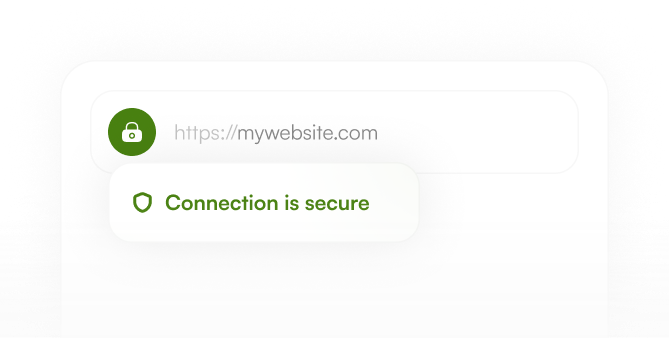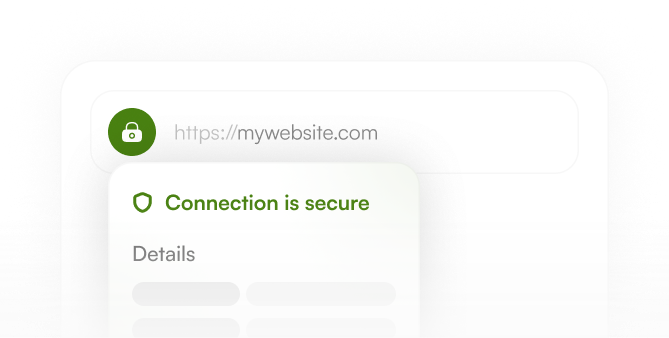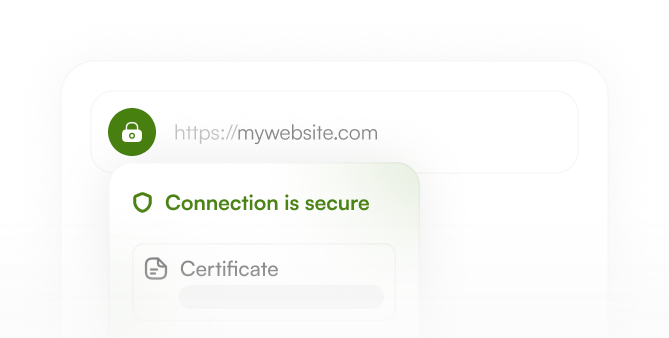Unlock Trust and Sales with an SSL Certificate
Encrypt sensitive data (like logins and credit cards) for ultimate security, show off a Trust Seal and padlock for enhanced trust, and boost your SEO ranking – all with one simple SSL certificate.
Starting at
Get Started Risk-free
Buy SSL Certificates
Our platform is truly unique. We've got you covered with both managed and self-managed hosting.

RapidSSL Certificate
 Save 20%
Save 20%Unlimited Sub-domains
Great For: Personal Websites
Issued: 2 Days
Reissue: Free
Warranty: $1,230,000.00
Encryption: 128/256 bit

QuickSSL Premium
 Save 20%
Save 20%Unlimited Sub-domains
Great For: Personal Websites
Issued: 2 Days
Reissue: Free
Warranty: $10,000
Encryption: 128/256 bit

True BusinessID
 Save 20%
Save 20%Unlimited Sub-domains
Great For: Business & Ecommerce
Issued: 2 Days
Reissue: Free
Warranty: $1,250,000
Encryption: 128/256 bit

RapidSSL Wildcard Certificate
 Save 20%
Save 20%Unlimited Sub-domains
Great For: Small Businesses
Issued: minutes
Reissue: Free
Warranty: $10,000
Encryption: 128/256 bit

True Business ID with EV
 Save 20%
Save 20%Unlimited Sub-domains
Great For: Business & Ecommerce
Issued: 2 Days
Reissue: Free
Warranty: $1,500,000
Encryption: 128/256 bit

QuickSSL Premium WildCard
 Save 20%
Save 20%Unlimited Sub-domains
Great For: Small Businesses
Issued: 2 Days
Reissue: Free
Warranty: $500,000
Encryption: 128/256 bit

DigiCert Secure Site
 Save 20%
Save 20%Unlimited Sub-domains
Great For: Business
Issued: 1-3 Days
Reissue: Free
Warranty: $1,500,000
Encryption: 128/256 bit

True Business ID Wildcard
 Save 20%
Save 20%Unlimited Sub-domains
Great For: Large Scale Businesses
Issued: 2 Days
Reissue: Free
Warranty: $1,250,000
Encryption: 128/256 bit

DigiCert Secure Site Pro
 Save 20%
Save 20%Unlimited Sub-domains
Great For: Business & Ecommerce
Issued: 1-3 Days
Reissue: Free
Warranty: $1,500,000
Encryption: 128/256 bit

DigiCert Secure Site EV
 Save 20%
Save 20%Unlimited Sub-domains
Great For: Business & Ecommerce
Issued: 1-5 Days
Reissue: Free
Warranty: $1,500,000
Encryption: 128/256 bit

DigiCert Secure Site Pro EV
 Save 20%
Save 20%Unlimited Sub-domains
Great For: Business & Ecommerce
Issued: 1-5 Days
Reissue: Free
Warranty: $1,750,000
Encryption: 128/256 bit
How to Choose Your SSL Certificate
When choosing your SSL certificate, see which category your website falls under.

Domain Validation (DV)
Best For

Organization Validation (OV)
Best For

Extended Validation (EV)
Best For
OR

Unbreakable Security, Absolute Trust
An SSL certificate is more than a padlock. It's the foundation of your online credibility. We provide powerful encryption that safeguards sensitive data and instills visitor confidence, turning browsers into buyers.
Earn Trust and Build Credibility
When a user sees the padlock icon and "https://" in their browser's address bar, they know your site is secure. This simple visual cue builds immediate trust and assures your visitors that their personal data—like passwords, credit card numbers, and other sensitive information—is protected from prying eyes. It’s a foundational step to building credibility and a professional brand online.


Talk to Real 24/7 Email Hosting Experts
Our friendly customer support team is here to answer any questions you have about SSL certificates or installation. Feel free to reach out us via live chat or email!
Why do I need an SSL certificate?
Not only does an SSL certificate encrypt data transmission to and from your website, but as of July 2018, many web browsers flagged a website as "not secure" unless it detects that it has a valid SSL certificate.

Strongest Encryption
Safety first - SSL encrypts data between visitors and servers, ensuring packets are unbreachable for security.

Address bar Visibility
Google Chrome and other browsers mark websites without SSL as unsecured. Get cheap SSL Certification to avoid a big red flag.

Increase traffic and sales
SSL certificates not only enhance website security but also reassure your audience, leading to increased sales.
How to manually install your SSL certificate
We built a suite of free tools that make creating beautiful, responsive websites fast and simple: WordPress themes, plugins, WordPress Backup Tool, and WordPress domain control.
Gather Your SSL Files
To install SSL on a website, two files are required: the website's SSL certificate, usually in .crt format.
Upload the SSL Files
Use FTP to access your server. Then, upload both the certificate and private key files to their designated locations.
Configure Your Server
Server software, such as Apache or Nginx, requires instructions to locate the uploaded certificate and key files.
Restart Your Server
After finalizing the server configuration, move on to implement the changes by restarting your web server.
SSL Certificates FAQs
Get clear answers about our hosting services, or let UltaAI assist you instantly.
An SSL certificate secures the connection between a user’s browser and your website. SSL certification ensures that the data exchanged remains private and integral. It also helps build trust with visitors by displaying a padlock icon and "https://" in the browser's address bar.
There are different types of SSL certificates Ultahost offers varying levels of validation. Domain Validation (DV) certificates are the most basic. Then there are Organization Validation (OV) certificates. And lastly Extended Validation (EV) certificates. EV certificates provide the highest level of trust with green address bars.
The best SSL certificate for your website depends on your specific needs and the level of trust you want to convey to visitors. If you collect sensitive data, an OV or EV certificate is recommended. For basic security on a non-commercial website, a DV certificate would be ideal.
The validity period of an SSL certificate varies depending on the type and issuer. Typically, SSL certificates are issued for one to two years. After expiration, you’ll need to renew your certificate to maintain secure connections.
SSL certificates don't slow down websites much. It adds only a tiny bit of extra work to transfer data. Plus, having an SSL certificate can actually make your website faster. Google likes websites with SSL certificates and might rank them higher in search results, which could boost your site's performance.
When you visit a website with an SSL certificate, your browser verifies the certificate's authenticity. Ensuring it's issued for the correct domain and hasn't expired. It then encrypts data exchanged between your browser and the server using a session key generated securely. This encryption safeguards sensitive information from interception, providing a secure browsing experience.
In most cases, SSL certificates are tied to the specific server or domain for which they were issued and cannot be transferred directly to another server. However, you can revoke the certificate and reissue it for the new server or domain. Be sure to follow proper procedures for certificate revocation and re-issuance to maintain security and validity.
OR
 English
English  Arabic
Arabic  Russian
Russian  Dutch
Dutch  French
French  German
German  Italian
Italian  Portuguese
Portuguese  Spanish
Spanish  Turkish
Turkish  Georgian
Georgian  Hindi
Hindi  Indonesian
Indonesian  Polish
Polish  Vietnamese
Vietnamese  Thai
Thai  Korean
Korean  Romanian
Romanian  Persian
Persian  Hungarian
Hungarian  Philippines
Philippines  Czech
Czech  Danish
Danish  Norwegian
Norwegian  Ukrainian
Ukrainian  Chinese
Chinese 

